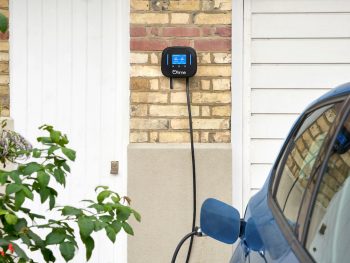Government smart charging plans could save EV drivers £1,000 a year
Electric vehicle drivers could slash their energy bills while helping to shore up the grid under newly revealed government plans.

The innovation plan sets out steps to “seize on the significant potential of smart charging” and make it the preferred method of long-duration charging by 2025ohme
The Electric Vehicle Smart Charging Action Plan published today by the Department for Business, Energy & Industrial Strategy and Ofgem sets out steps to “seize on the significant potential of smart charging” and make it the preferred method of long-duration charging by 2025.
Smart charging works by enabling drivers to charge their EVs when electricity is cheaper or cleaner and can be evolved into vehicle-to-home (V2H) and vehicle-to-grid (V2G), allowing consumers to power their home using electricity stored in their electric vehicle, or even sell it back to the grid for profit.
Recent research, such as the Electric Nation trial, has shown that such solutions could deliver significant benefits for consumers – and the new plans set out that high-mileage motorists could save up to £1,000 a year, echoing figures from a recent paper from intelligent power management firm Eaton.
The work could also ensure billpayers without EVs benefit from a more sustainable, secure and efficient electricity system, and also pay lower prices too – delivering a win-win situation for all consumers.
But barriers to such technology currently exist and the new plans sets out the steps currently being taken to “unlock the potential” of smart charging.
As of July 2022, all new charge points sold for private homes must have smart functionality but the new plans include work by the Government to improve publicly available information and evidence on smart charging, support the implementation of robust consumer service standards and ensure private charge points are secure and compatible with the latest energy innovations.
The UK is also consulting on a new policy and technical framework to unlock the benefits of domestic smart, flexible energy, and enhance its cybersecurity.
And the Government and Ofgem said they will seek to remove the barriers that currently prevent the full development of a diverse and competitive smart charging market, while making sure the energy system is ready to respond to the upturn in energy demand that electric vehicles will bring.
The Government has also committed to further investment to promote smart charging. The Department for Business, Energy & Industrial Strategy is to unlock £16m funding from the Net Zero Innovation Portfolio (NZIP) for technologies that harness the potential of smart charging.
Innovations receiving investment under the V2X Innovation Programme include a smart street lamppost which will enable motorists to access smart charging on the move, and projects that will enable domestic appliances, from heat pumps to electric vehicle charge points and batteries, to integrate into a smarter energy system.
Energy and Climate Minister Graham Stuart said: “We want to make smart charging an easier choice for drivers of electric vehicles, whether that is charging on the driveway, at the workplace, or parked on the street. To do that we need to build new network infrastructure at pace, using the latest available technologies.
“Today’s plan sets out how we will work with Ofgem and industry to kickstart the market for smart charging, which we are backing up with £16m in innovation funding. This will let people take control of their energy usage, in the most convenient and low-cost way.”
Energy regulator Ofgem said the new measures complement its work to deliver Britain’s net zero future at the lowest cost to customers.
Director for strategy and decarbonisation Neil Kenward said: “This latest innovative plan will help to maximise the benefits of smart charging, offer vital savings to consumers and reduce the overall cost of energy by seizing the opportunities to use batteries to both power homes and fuel the wider grid.”
National Grid Electricity Distribution has already welcomed the plans, which it said provide “another piece of the jigsaw for EV drivers” and give them a clearer indication of what their charging experience will look like.
Paul Jewell, system development manager, added: “For the industry, this provides greater certainty and allows distribution network operators like ourselves to build a future-proofed grid that utilises customers’ money in the most efficient way.
“From our own experience of taking part in the Electric Nation vehicle-to-grid charging project, we know that EV owners are happy to use their car as an additional battery for the grid and benefit from cheaper charging at off-peak times as a result. Scaling up smart charging across the country will allow us to double the amount of flexibility in the electricity system. It also brings wider benefits in that one unit of energy can be used multiple times on the grid through charging and discharging cycles.”
The DNO added that it already has systems in place that enable it to connect a customer’s EV charger to the grid whenever they are ready. And it’s expecting to support the connection of thousands of EV chargers, both domestic and at public charging points, over the 2023 to 2028 period.
“We are already responding to this challenge by investing in innovative technology that ensures we have a grid that can provide the energy needed in the right place and at the right time,” Jewell affirmed.

